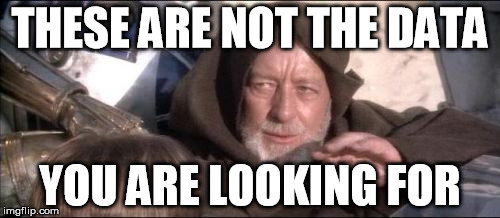‘Data is’ versus ‘data are’
Publishing statistics is a tricky business. ONS is constantly marrying the absolute requirement for statistical accuracy with communicating our key messages to as wide an audience as possible.
With such a diverse target readership there are often differences of opinion within ONS on how best to communicate our statistics.
This was evident in the first session of ONS’s Style Council – convened not only to settle differences of opinion on how best to communicate with our readers but also to set a consistent standard.
The style issue up for debate was whether we continue to use the phrase ‘data are’ or change it to ‘data is’?
The grammatically correct approach is ‘data are’, because the word ‘data’ is the plural of the latin word ‘datum’.
As a language pedant, who corrects errant apostrophes when I see them and prefers ‘fewer’ to ‘less’, I would normally uphold the rule of grammatical accuracy, but there were powerful arguments on both sides of the debate.
There is a body of opinion outside the ONS, opting for the ‘data is’ route.
The Oxford Dictionaries blog, hives the use of the word ‘data’ off into two directions; in scientific and technical writing it’s plural (data are). In general usage, ‘data’ can take a singular form.
You might argue that use of ‘data’ as a plural is fine in specialised, scientific fields. However, is that the field ONS is in? Perhaps in terms of the gathering and analysis of data, that is true. But what about the dissemination of this data? There’s the challenge.
Which begs the question, what is ONS? Is it an academic institution, a government agency or a publisher? All three, I’d say.
The Wall Street Journal decided to use the singular form of ‘data’ in 2012, because “most style guides and dictionaries have come to accept the use of the noun ‘data’ with either singular or plural verbs.”
The Oxford English Dictionary refers to ‘data’ as a “mass noun, similar to a word like information, which cannot normally have a plural and which takes a singular verb. Sentences such as ‘data was’ (as well as data were) collected over a number of years are now widely accepted in standard English.”
When the Guardian posted a piece on the topic in 2012, a user pointed out that although using the singular of ‘data’ was bad Latin, we’re not speaking Latin any more.
Guardian style guide guru David Marsh cites the example of the word ‘agenda’, a Latin plural now used almost universally as a singular. He described using its singular form ‘agendum’ as “hypercorrect, old-fashioned and pompous.”
The beauty of the English language is that it constantly and consistently evolves and publishers are faced with a choice over whether or not to maintain the status quo (not the band) or change to a word which has become more commonly used.
Our Style Council opted to continue referring to data as plural, the main rationale being that people were less likely to be offended.
It’s a valid point; which could be considered the lesser of two evils.
In the Style Council’s next meeting in the New Year, we hope to address that hotly-contested point concerning whether numbers under 10 should be written out in full. I anticipate much debate.
One comment on “‘Data is’ versus ‘data are’”
Comments are closed.


Write numbers as numbers, not words (except 1/one, which does need to be handled with care) Don’t go backwards after going forward!